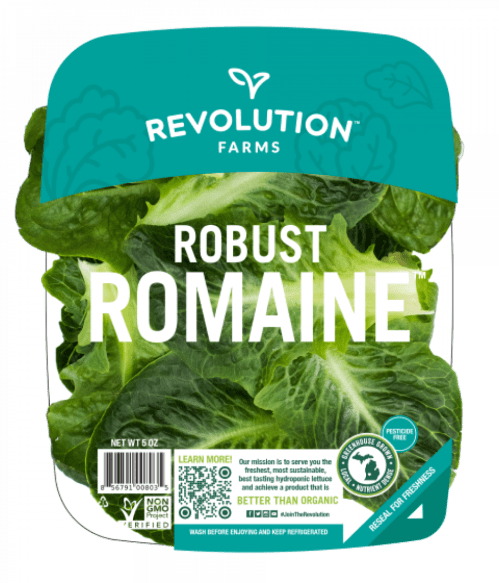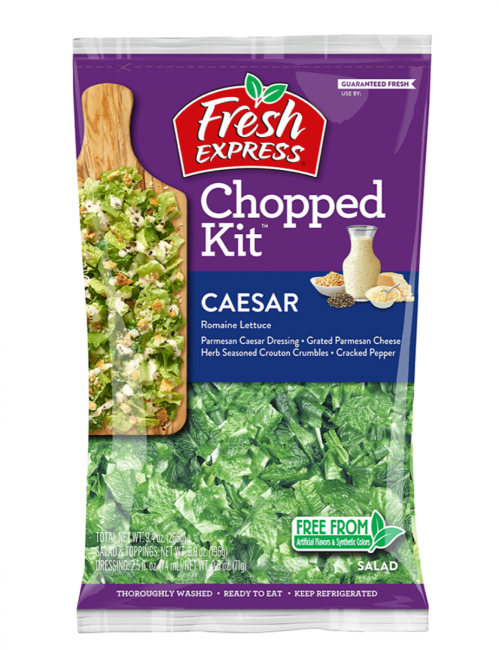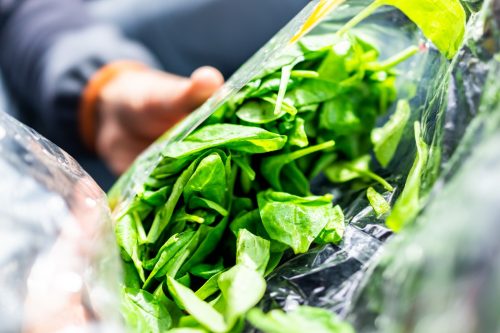Premade Salads and Salad Kits Recalled Over Potential Listeria Contamination, FDA Warns

Are you planning to make a salad to pack for lunch, or to serve your family for dinner? If so, you’ll want to check your produce first. Two different salad brands have just announced recalls. According to new alerts, the discovery of Listeria, a potentially fatal bacteria, has caused significant concern over multiple products that could already be in your fridge. Read on to find out more about the latest recall of premade salads and salad kits.
READ THIS NEXT: Strawberries Sold at Aldi and Costco Recalled Due to Hepatitis A Outbreak, FDA Warns.
One salad brand is recalling all of its products.

On April 5, the U.S. Food and Drug Administration (FDA) announced that Revolution Farms was voluntarily recalling several lettuce-based products distributed under its brand name. Just two days later, on April 7, the FDA said that the Michigan-based produce manufacturer would be expanding its recall to “include all products sold under the Revolution Farms brand.”
According to the latest alert, the recalled products were sold to several retailers and food service distributors across six states: Michigan, Ohio, Indiana, Illinois, Kentucky, and Wisconsin. The affected items from Revolution Farms include romaine lettuce sold in whole head, plastic tray, and bag form, as well as spring mix products and several salad kits, like the brand’s Zesty Southwest, Sesame Ginger Crunch, and Crisp Kale Caesar kits.
In conjunction with Revolution Farms, Meijer also announced on April 7 that it would be voluntarily recalling select “Fresh From Meijer” premade salads because they were supplied by the produce manufacturer. Affected products include Fresh From Meijer Tomato Caprese Salads, Cobb Salads, Chicken Caesar Salads, and Chicken BLT Salads.
“The recall is part of a broader Revolution Farms lettuce recall and includes premade salads carried at Meijer stores in Michigan, Indiana, Illinois, Ohio, Kentucky, and Wisconsin,” Meijer said in its press release.
Another company is also recalling salad kits.

The produce problems don’t end there. On April 7, the FDA issued another alert about a related recall. According to the agency, Fresh Express Incorporated is also voluntarily recalling some of its salad-based offerings. This recall affects a “limited quantity of three varieties of already-expired branded and private label salad kit products produced at the company’s Morrow, Georgia, facility,” the alert stated.
This includes certain Fresh Express Caesar Chopped Kits, which were distributed through retailers in Florida, Georgia, North Carolina, and South Carolina, along with certain Chopped Chipotle Cheddar Kits that were distributed by retailers in the same four states, as well as in Virginia.
The recall also affects some of the Publix-brand Makoto Honey Ginger Salad Kits that were sold to consumers through retailers in Florida, Georgia, and North Carolina.
RELATED: For more up-to-date information, sign up for our daily newsletter.
All of the products were recalled over contamination concerns.

The recalls from Revolution Farms and Fresh Express are both the result of potential health risks. As the FDA explained, the recalled products have potentially been contaminated with Listeria.
Revolution Farms initiated its recall after the Michigan Department of Agriculture and Rural Development (MDARD) received a positive result for Listeria monocytogenes from a random sample test of a package of the company’s Green Sweet Crisp lettuce. For Fresh Express, a positive Listeria result was gathered by the Georgia Department of Agriculture during a random sample test of a single salad kit from the company.
“Retailers have been instructed to remove all recalled products from store shelves. Consumers who have purchased the recalled products should discard them or return them to their place of purchase for a full refund,” the FDA advised about the Revolution Farms products.
The Fresh Express items are no longer available for sale, as they are already expired, but the agency said that “consumers who might still have the recalled products in their refrigerators should discard and not consume them.”
Listeria contamination can be fatal for some people.

You can develop a disease called listeriosis from consuming food that has been contaminated with Listeria monocytogenes. Symptoms may vary depending on the severity of your illness, with mild cases likely to cause fever, muscle aches, nausea, vomiting, and diarrhea, anywhere from a few hours to two or three days after eating contaminated food.
“More severe forms of listeriosis may take anywhere from three days to three months to develop,” the FDA says. “If the more severe form of listeriosis develops, symptoms may include headache, stiff neck, confusion, loss of balance, and convulsions.”
Certain individuals are more at risk for a severe listeriosis infection, according to the agency.
“Listeria monocytogenes can cause serious and sometimes fatal infections in young children, frail or elderly people and others with weakened immune systems,” the FDA explains, adding that Listeria infection can also “cause miscarriages and stillbirths among pregnant women.”
- Source: https://www.fda.gov/safety/recalls-market-withdrawals-safety-alerts/revolution-farms-announces-voluntary-recall-lettuce-because-possible-health-risk
- Source: https://www.fda.gov/safety/recalls-market-withdrawals-safety-alerts/revolution-farms-llc-announces-expanded-recall-lettuce-due-possible-health-risk
- Source: https://www.fda.gov/safety/recalls-market-withdrawals-safety-alerts/fresh-express-incorporated-announces-precautionary-recall-expired-fresh-salad-kits-due-potential
- Source: https://www.fda.gov/food/foodborne-pathogens/listeria-listeriosis